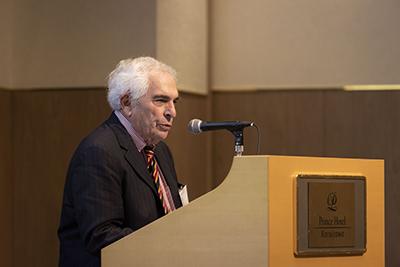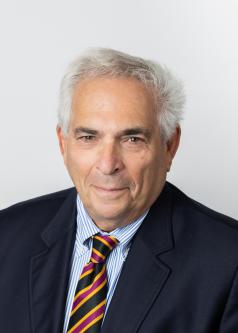Hal Scott, ’72: Finance Guru Has Taught at Harvard for 40 Years

Hal Scott, ’72, went to Princeton with the intention of becoming a poet, but he soon discovered that it wasn’t the right path for him. After Princeton, he went to Stanford and got a graduate degree in political science.
It wasn’t until he came to the Law School that he found his calling—one that has not only shaped his life but that has made an impact around the world.
“I was at the Law School during a wonderful time,” he recalled. “The law and economics movement was in its exciting early stages, being shaped by brilliant thinkers like Aaron Director and Richard Posner, while so many intellectual giants were also teaching: Gilmore, Kalven, Levi, and so many more.”
When a class with Soia Mentschikoff got him interested in payment systems (“It was just called ‘checks’ back then,” he recalled), a career was born: one that has included more than 40 years of teaching at Harvard Law School; popular and scholarly books that include a casebook now in its twenty-fifth edition; and the leadership of institutions and programs that have influenced all aspects of financial practices in the US and worldwide.
The teaching part was also a Law School epiphany. As a second-year student, Scott was in the office of Philip Kurland when a call came from a major law school looking for faculty candidates. “He covered the phone’s mouthpiece and asked me whether I’d be interested in teaching,” Scott recalled. “I had never thought about it, but it seemed like a nice idea, so I said I’d meet with them. He gave me a nice recommendation as I sat there. Phil Kurland recommending me was pretty inspiring, and they hired me as a future draft choice.”
Two years after graduating, having clerked for a US Court of Appeals judge and then for Supreme Court Justice Byron White, Scott joined the law faculty at the school that had called Kurland: UC-Berkeley.
That lasted a year. “California was too laid back for me,” he said. At Harvard, where he retired from teaching at the law school in 2018 but still teaches at the Kennedy School, his courses included capital markets regulation, international finance, the payment system, and securities regulation.
In 1986, he founded the Program on International Financial Systems [PIFS], which among other things hosts annual invitation-only symposia on building the financial system of the twenty-first century between the US and China, US and Europe, and US and Japan. PIFS became independent from Harvard in 2018; Scott still serves as its director. He is also the founder and director of the Committee on Capital Markets Regulation, a bipartisan, nonprofit organization dedicated to enhancing the competitiveness of US capital markets and ensuring the stability of the US financial system.
Scott was a director at Lazard for 10 years, served as a governor of the American Stock exchange, and is currently an outside director of the Members Exchange, a member-owned stock exchange that competes with the New York Stock Exchange, Nasdaq, and the Chicago Board Options Exchange. He regularly contributes opinion pieces to the Wall Street Journal, Financial Times, and other publications.
“I love the Law School, which was the beginning of so many things for me,” he said. “I got married during my first week there, and my wife and I now have two great daughters. I have many friends from my time there. I had gone to high school with Doug Ginsburg [’73], and then we were on Law Review together, and when he joined the Harvard faculty we taught the first law school course ever on banking regulation. I think UChicago as a whole is the most intellectually rigorous of all American universities—and I think all American universities today could benefit from reflecting on the principles related to social and political action that Harry Kalven’s report laid out in the 1960s and that Chicago still follows. How could I not love a place that has been so important for me and for all of society?”
